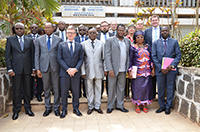© Universität Bielefeld
uni.news
Published on
22. Februar 2017
Category
General
Bilateral graduate school opens in Cameroon
Cooperation between Bielefeld University and the University of Yaounde I
YaBiNaPA, which stands for ‘Natural Products with Antiparasite and Antibacterial Activity’, is the name of the new bilateral graduate school set up by Bielefeld University and the University of Yaounde I (Cameroon) that has now been opened in Cameroon. Representatives of Bielefeld University travelled to the opening ceremony. Professor Dr. Norbert Sewald (Bielefeld University’s Faculty of Chemistry), Professor Dr. Gabriele Fischer von Mollard (Dean of Bielefeld University’s Faculty of Chemistry), and Dr. Thomas Lüttenberg (Head of Bielefeld University’s International Office) travelled to Cameroon for the YaBiNaPA opening ceremony that was also attended by the German Ambassador to Cameroon Dr. Hans-Dieter Stell.
 YaBiNaPA is being coordinated by Professor Dr. Norbert Sewald (Bielefeld University) and Professor Dr. Bruno Lenta (University of Yaounde I). Researchers at five further universities in Cameroon are associate partners. The bilateral graduate school is dedicated to carrying out systematic research on plants used in traditional African medicine – particularly those used to treat parasitic diseases (such as malaria) and bacterial infectious diseases. The school will not only carry out scientific research on the effects of these plants but also use chemical analyses to make plant-based extracts safer by excluding any harmful side effects. At the same time, YaBiNaPA aims to deliver research-related and practically oriented training on the spot in Cameroon for young chemists, biologists, and pharmacists.
YaBiNaPA is being coordinated by Professor Dr. Norbert Sewald (Bielefeld University) and Professor Dr. Bruno Lenta (University of Yaounde I). Researchers at five further universities in Cameroon are associate partners. The bilateral graduate school is dedicated to carrying out systematic research on plants used in traditional African medicine – particularly those used to treat parasitic diseases (such as malaria) and bacterial infectious diseases. The school will not only carry out scientific research on the effects of these plants but also use chemical analyses to make plant-based extracts safer by excluding any harmful side effects. At the same time, YaBiNaPA aims to deliver research-related and practically oriented training on the spot in Cameroon for young chemists, biologists, and pharmacists.
Plant-based drugs play an important role in African countries, because many people cannot afford synthetically produced pharmaceuticals. The great diversity of plant species in African rainforests and savannas administered by traditional healers forms a reservoir of unexplored substances and combinations of substances.
The project is being supported until the end of 2020 by the German Academic Exchange Service (DAAD) with funds from the Federal Ministry of Economic Cooperation and Development (BMZ). On the one side, the project is funding doctoral students and guests in Yaoundé and Bielefeld with grants and scholarships. On the other side, it is building up the necessary infrastructure for the elaborate lab work. For example, laboratory equipment and highly sensitive analysis equipment is being installed in Yaoundé. This includes a HPLC-MS system that does not just separate complex mixtures of substances in plant extracts. It also goes on to analyse the chemical composition of each component.
YaBiNaPA, which stands for ‘Natural Products with Antiparasite and Antibacterial Activity’, is the name of the new bilateral graduate school set up by Bielefeld University and the University of Yaounde I (Cameroon) that has now been opened in Cameroon. Representatives of Bielefeld University travelled to the opening ceremony. Professor Dr. Norbert Sewald (Bielefeld University’s Faculty of Chemistry), Professor Dr. Gabriele Fischer von Mollard (Dean of Bielefeld University’s Faculty of Chemistry), and Dr. Thomas Lüttenberg (Head of Bielefeld University’s International Office) travelled to Cameroon for the YaBiNaPA opening ceremony that was also attended by the German Ambassador to Cameroon Dr. Hans-Dieter Stell.
Representatives from Cameroon and Germany celebrate the opening of the new bilateral graduate school YaBiNaPA being run by Bielefeld University and the University of Yaounde I. Photo: University of Yaounde I
Plant-based drugs play an important role in African countries, because many people cannot afford synthetically produced pharmaceuticals. The great diversity of plant species in African rainforests and savannas administered by traditional healers forms a reservoir of unexplored substances and combinations of substances.
The project is being supported until the end of 2020 by the German Academic Exchange Service (DAAD) with funds from the Federal Ministry of Economic Cooperation and Development (BMZ). On the one side, the project is funding doctoral students and guests in Yaoundé and Bielefeld with grants and scholarships. On the other side, it is building up the necessary infrastructure for the elaborate lab work. For example, laboratory equipment and highly sensitive analysis equipment is being installed in Yaoundé. This includes a HPLC-MS system that does not just separate complex mixtures of substances in plant extracts. It also goes on to analyse the chemical composition of each component.